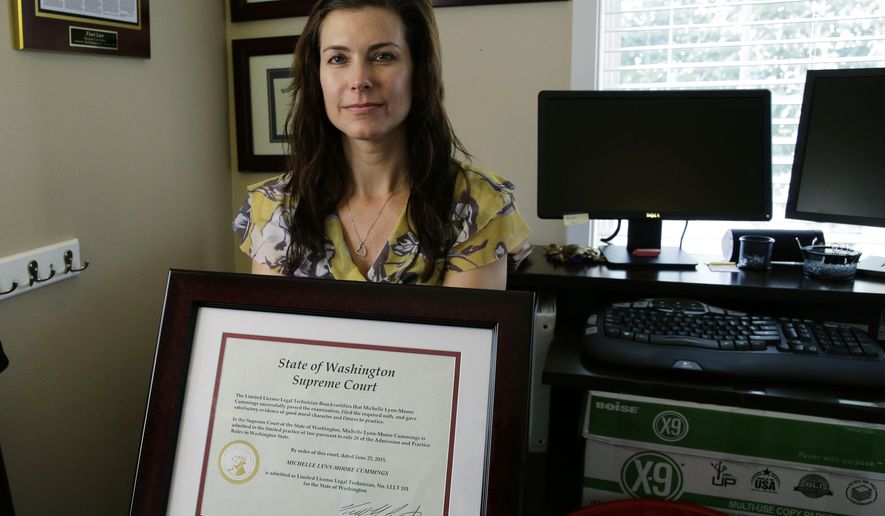SEATTLE (AP) - Marcia Jackson sat at a wooden table between long shelves of books at the King County Law Library. The 64-year-old cook needed help dealing with what she described as a complex family trust issue.
She had come to one of the few places where she could get it: a neighborhood law clinic, where volunteer lawyers dish out advice on a wide range of legal topics, for free.
“When you’re talking about protecting yourself and knowing your rights, that shouldn’t be just for rich people,” she said.
The state Supreme Court had people like Jackson in mind this year when it made Washington the first state to begin licensing non-lawyers to give legal advice, for a fraction of what lawyers often charge.
Under the “limited license legal technician” program, experienced paralegals who take additional courses in certain practice areas - for now, just family law - and who pass relevant exams become what’s been described as the nurse practitioners of the legal world.
They can advise clients, perform legal research and draft documents to be filed, though they can’t represent their clients in court or negotiate on their behalf.
“There’s a crucial need,” said Professor Deborah Rhode, director of Stanford Law School’s Center on the Legal Profession, noting that surveys have shown “over four-fifths of the legal needs of poor people and close to one-half of the needs of moderate income people are not being met.”
“Lawyers have priced themselves out of the market for people of limited means,” she said.
Washington’s program is off to a slow start since it launched in June, with just one “3LT” practicing so far - and even she hasn’t had any clients yet. A handful of others have passed their exams but haven’t yet been able to obtain malpractice insurance. But more than two dozen people are taking the additional legal coursework required, and, according the Washington State Bar Association, as many as 100 more are enrolling in classes this fall.
Despite the efforts of lawyers who staff neighborhood legal clinics or otherwise offer free or cut-rate legal help, an estimated 1.6 million people in the state navigate the court system on their own each year.
Steve Crossland, chair of the bar association’s limited license legal technician board, and the bar association’s president, Paula Littlewood, said they have traveled to 15 states to talk about Washington’s new program, and seven states have taken steps toward launching similar programs. They include California, Oregon, New Mexico, Colorado, Minnesota, Florida and Utah.
The first limited license legal technician in Washington is Michelle Cummings, a 42-year-old paralegal at Fiori Law Office in Auburn, who received her license June. She hasn’t had any clients yet, she said - something she attributes to few people knowing about the new legal tech program.
Her boss at the law firm encouraged her to participate in the program, as a way to offer a wider range of services to the firm’s clients, she said.
Cummings said she volunteers at a free legal clinic in Federal Way, checking people in for their meetings with attorneys, and she’s seen how busy it is. She’ll charge $110 an hour as a legal tech, less than half what attorneys in the firm charge.
The legal techs must complete 3,000 hours of work as a paralegal, 45 hours of core curriculum through an American Bar Association-approved legal program, and a family law course offered through the University of Washington Law School. The standards are so stringent in part because many lawyers in the state long opposed the creation of the legal tech program, fearing it would create second-class legal advice for poorer residents.
That thinking has changed in recent years, Crossland said: “People have started looking at the bigger issue, which is how do we serve and protect the public.”
Nevertheless, Rhode questioned whether Washington’s requirements are so burdensome that they’ll keep the program from helping as many people as it could.
“You see a relatively small number of individuals ready to jump through the hoops,” she said. “Many countries have non-lawyers handling these matters without adverse effects.”
As Washington’s program expands, it could also offer legal technicians to handle elder law, landlord tenant disputes and immigration cases.
For Jackson, whose visit to the King County neighborhood legal clinic garnered her a reference to another attorney, the idea of paying a sort of super-paralegal was appealing.
“They know just as much if not more than all your judges and lawyers,” she said. “They’re the ones who do all the work.”




Please read our comment policy before commenting.